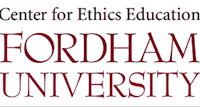
Dr. Jonathon Rendina, Hunter College, CUNY
The minority stress theory suggests that health disparities experienced by gay and bisexual men (GBM) and other sexual minorities can be explained in terms of stigma-related stressors such as discrimination at work, school, religious institutions, communities and families.
The unique stressors of an HIV-positive status experienced by GBM, however, has been overlooked within research on minority stress.
Fordham University Center for Ethics Education HIV and Drug Abuse Prevention Research Ethics Training Institute (RETI) Fellow Dr. Jon Rendina, an Assistant Professor in the Department of Psychology and Faculty Investigator and Director of Quantitative Methods at The Center for HIV Educational Studies & Training (CHEST) of Hunter College, CUNY, recently addressed this issue within a paper published in Annals of Behavioral Medicine.
Dr. Rendina has been conducting HIV research with GBM for more than ten years. He explained the need to thoroughly test “the role of internalized stigma about sexual orientation, or internalized homophobia, and internalized HIV stigma within a unified model to see whether one or both have an impact on HIV-positive gay or bisexual men.” Although it is already established that GBM are negatively impacted by internalized sexual minority stigma, the purpose of this study was to further explore the impact of HIV-related stressors on the health of GBM.
Men who experienced both stigmas reported greater symptoms of depression, anxiety, and sexual compulsivity and were also more likely to engage in sexual behaviors that put them and their partners at risk.
“The study shows the critical importance of addressing stigma at the societal level,” Dr. Rendina explained, “because health disparities faced by gay and bisexual men relative to the general population, particularly in regard to mental health and HIV, are being fueled in part by societal stigma.”
Moving forward, Dr. Rendina hopes the results of this study will be used to develop interventions that may “reduce the extent to which these men internalize stigma and break its connection with mental health and health behaviors.” Dr. Jeffrey Parsons, Distinguished Professor of Psychology at Hunter College and the Director of CHEST was the senior author on this paper. He added, “We should develop interventions to try to reduce the extent to which these men internalize stigma to improve health, but ultimately the eradication of stigma is likely to have the most profound impact.”
Thinking about the research training he received at RETI, Dr. Rendina indicated that “the biggest ethical challenge related to this research is how we can study stigma while minimizing the risk of exacerbating it.” He shared that it is “critical to show the impact of stigma on health in order to demonstrate the benefits of intervening on it–at both the societal and individual levels” and to do this in a way that is “culturally sensitive and does not reinforce negative experiences for our participants.”
Please click here for more information on the Fordham University HIV Prevention Research Ethics Training Institute (RETI).
Citation: Rendina, H.J., Gamarel, K.E., Pachankis, J.E. et al. Extending the Minority Stress Model to Incorporate HIV-Positive Gay and Bisexual Men’s Experiences: a Longitudinal Examination of Mental Health and Sexual Risk Behavior. ann. behav. med. (2016). doi:10.1007/s12160-016-9822-8
Written By Fordham University Center for Ethics Education
Fordham RETI Fellow Addresses Stigma for HIV-Positive Gay and Bisexual Men was originally published @ Ethics and Society and has been syndicated with permission.
Sources:
Our authors want to hear from you! Click to leave a comment
Related Posts





